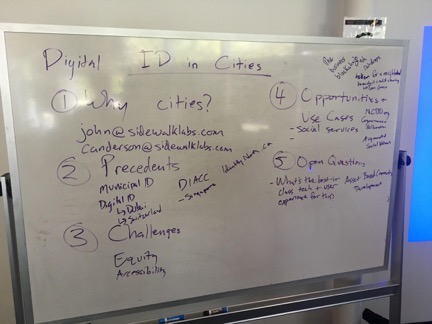Dgital ID in Cities – Use Cases and Pilots
From IIW
Digital ID in Cities – Use Cases and Pilots
Conveners: John Wittrock (john@sidewalklabs.com), Chris Anderson (canderson@sidewalklabs.com)
Notes-takers: John Wittrock, Chris Anderson
Discussion notes, key understandings, outstanding questions, observations, and, if appropriate to this discussion: action items, next steps:
Cities, Municipal ID, Self-sovereign ID user experience, ...
- Intro to Sidewalk Labs:
- Building a part of a city, and sees identity as crucial to the experience in a city from the internet up
- But see the need to preserve privacy and social contracts around how we already interact with cities.
- Why cities?
- Flexibility - doesn’t need to work for an entire country
- Smallest unit of gov’t - allows public oversight
- Precedents
- Municipal IDs: nycID, Elm City ID, Dubai
- Digital driver’s licenses
- Federated logins: Securekey
- Status quo: log in and pay parking ticket with your driver’s license
- Digital ID: Dubai, Switzerland, Singapore
- How do cities tend to work?
- Pilots, RFPs, etc.
- Unique challenges to cities
- Cities are going to require a credible “help button” for users
- Cities may want some sort of ability to reset the system or at least prevent forks
- Equity, accessibility problems pervade all city services problems
- As much as we like to talk about the backend tech, much of this is a user experience problem
- Use cases
- Access to city services
- Physical services - courthouses, police stations
- Digital services
- Verifiable citizen engagement
- Proofing for service providers
- Physical access control
- Access to city services
- Existing pilots
- Illinois, would love to hear about that
- British Columbia: DIACC
- Potential pilots
- Start small: citizen engagement, feedback, homeowners association
- Open Questions:
- What’s the best-in-class tech for user experience and backend implementation?
